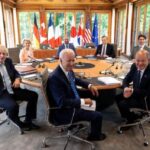
* Government presses ahead with new law
* Second reading is latest step
* Faces resistance in upper house (Adds Johnson comments)
LONDON, June 26 (Reuters) – British Prime Minister Boris Johnson said on Monday parliament could pass legislation this year to scrap some of the rules on post-Brexit trade with Northern Ireland that his government agreed in 2020 with the European Union.
The legislation, which would unilaterally replace parts of that bilateral deal – known as the Northern Ireland protocol – is due to be sent back to parliament’s lower house for a second reading. That is one of the stages of the law’s passage through the legislature.
A bigger challenge will be when it moves to the upper house, the unelected House of Lords, where many peers have expressed concern about it.
Tensions have simmered for months after Britain accused the EU of a heavy-handed approach to the movement of goods between Britain and Northern Ireland – checks needed to keep an open border with EU member Ireland.
Johnson says the new legislation will bring about “relatively trivial” changes to the protocol to ease trade within the United Kingdom, but the EU has launched legal proceedings against Britain over it.
Asked if the changes could be implemented this year, Johnson told broadcasters: “Yes, I think we could do it very fast, parliament willing”.
Foreign minister Liz Truss said London’s priority was to protect a 1998 peace deal that Ireland, the United States and other countries have said could be put at risk by replacing parts of the protocol.
“This legislation will fix the problems the protocol has created, ensuring that goods can flow freely within the UK, while …safeguarding the EU single market,” Truss said in a statement on Sunday.
“A negotiated solution has been and remains our preference, but the EU continues to rule out changing the protocol itself …which therefore means we are obliged to act.”
Britain plans to stop some checks on goods moving to Northern Ireland from the rest of the United Kingdom and it is challenging the role played by the EU’s court.
The EU’s ambassador to Britain said on Sunday that Britain’s plans were illegal and unrealistic.
“It is a treaty that we signed, ratified and even went through a general election in this country,” Joao Vale de Almeida told Sky News. (Reporting by William Schomberg and Kylie MacLellan, writing by Elizabeth Piper, editing by Jane Merriman and John Stonestreet)




